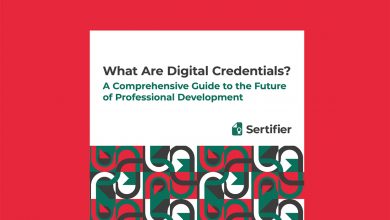Digital Credentials for HR and Talent Management
Contents
In today’s digital age, technology has become integral to our lives, prompting organizations to adopt digital solutions for streamlined operations. Human resources (HR) and talent management are among the areas experiencing significant transformation, with digital credentialing emerging as a powerful tool. This article explores the advantages of utilizing digital credentialing in HR and talent management.
Enhanced Efficiency and Accuracy
One of the primary benefits of digital credentialing is the enhancement of efficiency and accuracy. Traditionally, HR departments have relied on paper-based or manual processes. Digital credentialing automates these tasks, significantly boosting efficiency.
Digital credentials enable the centralized and secure collection, storage, and management of employee data. This information can be integrated with various digital platforms to automate tasks such as recruitment, compensation management, and performance reviews. Automation reduces manual data entry errors, minimizes paperwork, and ensures data integrity. As a result, HR professionals can focus on strategic initiatives and talent development, leading to increased operational efficiency.
For instance, the recruitment process becomes more streamlined with digital credentialing. Online platforms and application tracking systems comprehensively assess candidates’ qualifications, skills, and experience. Digital authentication tools verify candidates’ credentials and detect fraudulent activities, ensuring that only qualified and reliable individuals are hired.

Digital credentialing also enhances accuracy and reliability. With employees’ skills, certifications, educational backgrounds, and performance data digitally recorded, HR departments can access accurate and up-to-date information, leading to better decision-making in recruitment, promotions, and talent management strategies.
Streamlined Recruitment Process
Digital credentialing significantly streamlines the recruitment process, which is crucial for organizational success. By leveraging digital credentials, HR departments can more effectively and efficiently evaluate candidates’ qualifications and experiences.
Job postings on digital platforms allow for the collection of comprehensive candidate information through online application forms. This approach provides access to a wider talent pool and more detailed insights into potential candidates.
Moreover, digital authentication tools quickly and reliably verify candidates’ credentials, ensuring decisions are based on solid, trustworthy information. This reliability enhances the quality of hires and reduces the time and resources spent on the recruitment process.

Personalized Employee Experiences
Digital credentialing allows HR departments to deliver personalized experiences for employees, recognizing their unique preferences, goals, and development needs.
Credentials capture employees’ skills, interests, career goals, and past performance, guiding HR in identifying strengths and areas for improvement. This information enables HR professionals to offer tailored training and development programs, job rotations, and growth opportunities. For example, an employee interested in a particular area can receive specific training to develop relevant skills.
Personalized experiences lead to higher employee engagement, job satisfaction, and motivation. When employees feel valued and understood, their commitment to the organization increases, reducing turnover rates.
Additionally, digital credentialing supports employee career planning. By analyzing employees’ credentials, HR departments can identify career paths and opportunities that align with their goals, providing the necessary resources for career advancement.
Personalized experiences also strengthen the employer brand and workplace culture. Employees who feel valued are more loyal, enhancing the company’s reputation and fostering a positive workplace atmosphere.

Data-Driven Decision Making
Data-driven decision making is a crucial aspect of utilizing digital credentialing for HR and talent management. By leveraging the extensive data available through digital credentials, HR professionals can make informed decisions based on evidence and insights rather than intuition.
Key Benefits of Data-Driven Decision Making:
- Objective and Unbiased Decisions: Data-driven decision making eliminates biases and subjective opinions. HR professionals can analyze data to make objective decisions supported by evidence, rather than relying on personal preferences or assumptions.
- Improved Accuracy: Analyzing trends, patterns, and correlations within employee data provides a deeper understanding of the workforce. This leads to more accurate predictions about future outcomes and areas for improvement.
- Strategic Workforce Planning: Data-driven insights enable HR to align talent strategies with business objectives. By identifying skill gaps and forecasting future talent needs, HR can develop targeted recruitment and training programs, ensuring the organization has the right talent in place.
- Performance Management and Employee Development: Data-driven insights into performance metrics and training outcomes help identify high-performing employees and areas needing improvement. This enables the design of personalized development plans, enhancing individual and organizational growth.
- Risk Mitigation: Analyzing employee data can identify factors contributing to turnover, dissatisfaction, or performance issues, allowing HR to proactively address these problems and retain top talent.
- Continuous Improvement: Regular analysis and monitoring of HR data promote a culture of continuous improvement. Organizations can evaluate the effectiveness of their strategies and make necessary adjustments, ensuring they remain adaptable to changing needs and market dynamics.

In conclusion, the benefits of digital credentialing for HR and talent management are extensive. From enhanced efficiency and accuracy to personalized employee experiences and data-driven decision making, digital solutions optimize HR processes and foster a positive employee experience. As technology evolves, adopting digital credentialing will be crucial for organizations aiming to attract, develop, and retain top talent in the digital age.



